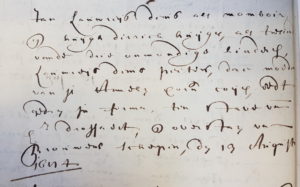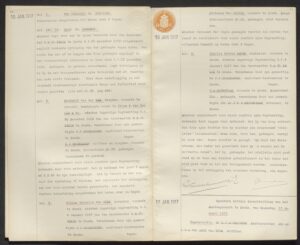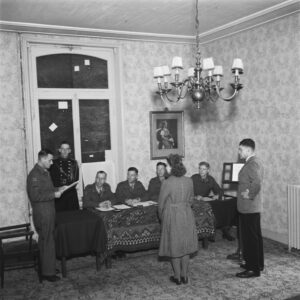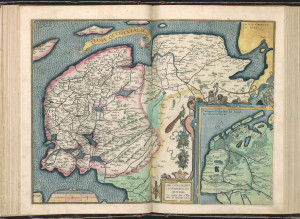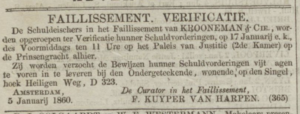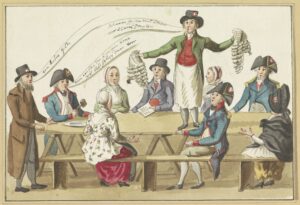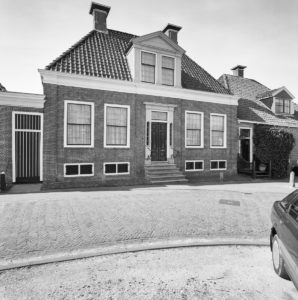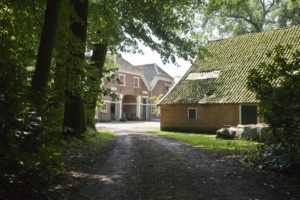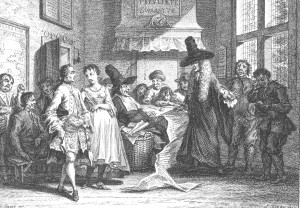Vrijwillige rechtspraak means voluntary justice. You may come across the term in finding aids of court records. The series of vrijwillige rechtspraak are cases where the court is involved, but nobody is charging or sueing anyone. Examples of records you may find in the series of voluntary records are prenuptial agreements, guardianship appointments, last wills, or estate divisions. In regions that had notaries, you may encounter those types of records in the archives of the notaries instead. … [Read more...]
Dutch term – Audiëntieblad
An audiëntieblad (literally: audience sheet or audience paper) are the transcripts of court sessions, created by court clerks. Audiëntiebladen record the cases that were heard on a day, including continuances. Some include the verdicts, but sometimes the verdicts are kept in a different series. You can find audiëntiebladen in the series of court records of the local and district courts. Court records older than 75 years are typically kept at the regional historical centers in the provincial … [Read more...]
Quick tip – No courthouse research in the Netherlands
In the Netherlands, we do not do any of our research in courthouses. If you are an American genealogist, you may be used to visiting the courthouse to get court records. In the Netherlands, such records are transferred to government archives after twenty years. They are typically public after seventy-five years. They are increasingly available online, either as scanned images or via scanning-on-demand. Otherwise, the records can be consulted at the archives in person. Access to court … [Read more...]
Dutch term – Krijgsraad
Krijgsraad means "court martial." You may find a reference to a court martial in your ancestor's military records if they made severe transgressions. If the person was sentenced to a prison sentence, prison records may also refer to the court martial verdict. Court martial records are typically kept in the regional historical center in the provincial capital. … [Read more...]
Dutch term – Quaclappen
Quaclappen is an archaic Dutch word that originally meant to gossip or slander. In genealogy, you may come across the term in court records, as the summaries of verdicts in civil cases. I have mostly come across the term in Friesland, where the index of quaclappen for 1527-1591 are available via Alle Friezen. Transcriptions for 1600-1620 are available via Tresoar. … [Read more...]
Source – Bankruptcy files
If someone is unable to meet his financial obligations, the court can be asked to declare him bankrupt. The court appoints a curator who inventories the debts and assets of the bankrupt person, who the creditors are, and how they can best be paid. When everything is settled, which could take years, the bankruptcy is ended. Bankruptcy files Records are created of all the actions that happen after somebody is declared bankrupt. Together, these form a bankruptcy files. These files are part of the … [Read more...]
Dutch term – Veiling
A veiling is an auction. You can sometimes find announcements of auctions in the paper, for example if a family is about to emigrate and is auctioning off their household items they won't take with them. Such an auction would be called a boelgoed in Friesland. Sometimes, notarial or voluntary court records were created to record the conditions and results of the auction. These can give you great insights into the lives of your ancestor since it shows you what items they owned. Auctions … [Read more...]
Dutch term – Vredegerecht
The Vredegerecht (sometimes spelled vredegeregt) is the Peace Court or Justice of the Peace. The system of vredegerechten was introduced during the French occupation and lasted from 1811 to 1838. The Vredegerecht held the lower jurisdiction in a canton, a district roughly the size of one or a few municipalities. After 1838, the vredegerechten were renamed to kantongerechten. In Belgium, these courts are still called vredegerechten. The vredegerechten only had the jurisdiction over … [Read more...]
Case study – Using Estate Inventories
In Winterswijk, Gelderland in 1754, Jan Hendrik Hilbelink was a widower with four young children, who wanted to marry again. Before being allowed to do so, he had to come to an agreement with the guardians of his minor children. He made an estate inventory of all the possessions of him and his late wife, Aaltjen Vriesen. Their children would be entitled to her half. The inventory consists of the following items: 1 piece of farm land cooking tools (pots, baking trough, sifs) 2 … [Read more...]
Quick tip – Civil Cases can Contain Earlier Records
Civil court cases can be a treasure trove of information. To support their claims, the parties may have had copies made of records that were kept in their family, or perhaps drew maps to show a boundary dispute. In my own tree, I was able to prove the parents of a woman who married around 1677 by going through a civil case involving the inheritance of her grandson in 1710. The case file included prenuptial records of several family members, including the woman I was looking for. The … [Read more...]
